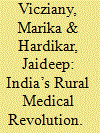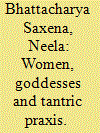| Srl | Item |
| 1 |
ID:
182855


|
|
|
|
|
| Summary/Abstract |
This article explores the potential conflict between allopathic (‘Western’) medicine and rural beliefs in village goddesses, given that each demands blood for diagnostic purposes and sacrifices, respectively. Our objective is to understand the experiences and attitudes of rural residents to blood tests, blood donations and blood transfusions. We explore the specific question of the extent to which poor villagers in Wardha district, Maharashtra, might be supportive of or opposed to point-of-care blood testing at their doorsteps. We began by asking them about their religious practices, including the sacrifice of animals and offerings of blood to deities. Such values could affect their perspectives on human blood and allopathic medicine. After that, we asked whether they had any fears about modern medical treatments and technologies—such fears might be driven by anxieties about angering goddesses if human blood was used for non-sacred purposes. Our investigations took us into an inquiry about villagers’ experiences with hospitals. We came to realise that for villagers, despite the costs of hospital diagnosis and treatment, hospitalisation had become a source of new knowledge about blood. And, finally, we asked villagers what they thought about the value of point-of-care blood testing at their doorstep. We were told that the high cost of hospital treatment means that villagers support technologies that can be used at their doorstep and work towards improving their health and longevity.
|
|
|
|
|
|
|
|
|
|
|
|
|
|
|
|
| 2 |
ID:
180278


|
|
|
|
|
| Summary/Abstract |
While modern India is complex, plural and perhaps foundationally connected with its rich liberatory paths, there is reason to be concerned when a large number of people are fed hate-filled rhetoric against their own long-term neighbors. Today the virulent ideology of a purported “Hindu” rashtra is growing under governmental provocation. It needs an alternative vision which can be resurrected from India's own suppressed history. That is Tantric India, whose liberatory paths with women and goddesses is compatible with the contemporary world. India has been a magnet for “spiritual” seekers around the world because the great sages were helping to free us from our conditioned selves. This worldview, that encompassed all Indic dharmas, was developed especially by Shaiva, Shakta and Buddhist enlightened beings, and was set against an upper caste hegemony of truncated Vedism. The true masters who developed a real science of tantric praxis taught how to appreciate the world here and now without violence to the self, earth or the perceived other. From ancient yogic explorations of humanistic psycho-spiritual development that has been a hallmark of India, a profoundly egalitarian world view had developed during 8th through 12th centuries. It is time we reexamine that history and imagine a different Subcontinent.
|
|
|
|
|
|
|
|
|
|
|
|
|
|
|
|